Newest Developments in the Triple Murder Case in Split
As is to be expected, the triple murder that took place last Saturday in Split has gotten quite a lot of attention from the Croatian public and the media, and every day we seem to be getting more and more information about the killer, his troubled past, the victims, and the case overall.
Unfortunately, again, as can be expected in this era of fake news, it's almost impossible to discern which information the Croatian media has been publishing is entirely true, which is partially true and which is blatant "fake news".
So, first of all, let's list some of the new information that can be somewhat independently confirmed: one of the most renowned Croatian lawyers, Branko Šerić, has officially become Filip Zavadlav's lawyer. The original news of this development included the statement that he was hired "by the Facebook group started in support of Filip Zavadlav".
It's still unclear how exactly a Facebook group can hire a high-level lawyer (read this as: it's obvious that somebody paid for Šerić, but wants to hide their identity behind the Facebook group). In the meantime, since we last posted about the crime, the group has been banned by Facebook, and other groups, most of them hidden and accessible only if you're invited, have been started. Also, there are rumours of a big protest being organised in Split this Saturday, in support of Filip, but it's unclear who's organising it, and the Split police say they haven't been informed of such an event.
Šerić has told the Croatian media that Filip Zavadlav has since been transported to Zagreb, to the hospital for the incarcerated persons in Svetošimunska street in Zagreb, where he is under constant supervision by the guards, as there are reasons to be afraid that some of the other people at the hospital might want to do harm to him, or that he could be a danger to himself.
Hopefully, the "constant supervision" will be somewhat better than it was in the case of Jeffrey Epstein, who was also supposedly on suicide watch 24/7, and yet, somehow, managed to die in jail. Branko Šerić, Zavadlav's attorney, wants an expert evaluation by a mental health professional to be performed on his client as soon as possible, which shouldn't surprise anyone as some of the reports after his apprehension talked about him being completely deranged, not saying anything when questioned and even becoming suicidal.
One other person who has been in the focus of the Croatian media in the past few days is Etel Zavadlav, Filip's mother. She is currently working in Austria, and has been extremely active on social media since the triple murder, but at the same time, a lot of nasty things from the family's history have also surfaced.
Slobodna Dalmacija reports on her being convicted of abusing her children in 2008, when Filip and his younger brother (the one currently spending time in a commune for drug users in Montenegro) asked the police to help protect them from the physical and mental abuse perpetrated by their mother.
She spent 40 days in prison in Split for repeatedly abusing her underage children (yes, you read that correctly). Filip was supposedly not living with his brother, his mother is in Austria so the entire motive for the triple murder, presented as "he was afraid for his family, as the dealers threatened harm against his family members" becomes questionable, but the criminal investigation will surely show what exactly happened. Etel Zavadlav has also denied the claims that both she and Filip were convicted of trying to steal money from a church together, as was previously reported.
One other thing is thoroughly investigated by not just the police, but also by numerous Croatian intelligence services is how was Filip able to acquire an AK-47 gun. It's illegal to possess such a gun in Croatia, so obviously it's illegal to sell it, so whoever provided it to Zavadlav also committed a serious crime.
While there is still quite a lot of arms in the hands of the Croatian civilians, which is the result of a war which happened almost 30 years ago, it's quite clear that a 25-year-old who committed a triple murder can't say that the AK-47 is something he kept from the war, so investigating where and how he got it might lead to some interesting conclusions.
Adrian Chiles Discusses Croatian Words for Genitalia in Guardian Article
Anyone who knows even a little bit of Croatian will know that this is an extremely colourful language. Descriptive, imaginative and above all blunt. There are countless ways to describe your disappointment, dismay or anger, and because of the sheer linguistic scope of Croatian, swearing is often seen as an effective way to showcase the strength of your emotions when speaking and isn't deemed as unintelligent, nor is looked down anywhere near as much as it is in other languages.
We've compiled several lists highlighting the colours of this ''picturesque'' South Slavic language (you can read them here, and here) and learn a few ways in which to swear while you're at it.
Adrian Chiles, a well known British presenter, has a Croatian mother and as such has ties with the country and its language. In his musings in the popular British publication The Guardian, he has previously written about his desire to get his hands on a Croatian passport, detailing how his Croatian friends used to be jealous of his shiny, burgundy British travel document and how the tables have turned since the shock result of the EU referendum.
In his latest opinion piece for The Guardian, he discusses precisely the character of the Croatian language and just how many words and phrases there are to describe genitalia. Yes. Genitalia.
As The Guardian/Adrian Chiles writes on the 16th of January, 2020, Chiles asks just why the English language doesn't have as many colourful words for genitalia as Croatian does. In fairness, British English, with all of its regional accents and dialects, most of which differ enormously from each other, there are many terms that could be used to describe genitalia, but is it quite on a par with Croatian?
He details the story of his Croatian friends who, through a twist of fate started by Adrian's innocent mistake, developed a publishing business. The pair are now engaged in translating erotic fiction into Croatian. There, Adrian was met with an array of words such as pimpek, sladostrašće and more.
Click here to read Adrian's amusing take on the differing linguistic attitudes to sex in the English and the Croatian languages, and try not to blush while you're at it.
Make sure to follow our dedicated lifestyle page for more.
Plenković: Young People Migrating for Financial Reasons, Not Because of Corruption
ZAGREB, January 16, 2020 - Croatian Prime Minister Andrej Plenković has told the German Frankfurter Allgemeine Zeitung daily that many of the young people who are leaving Croatia to work abroad are migrating for financial reasons and not because of corruption and nepotism.
"It's true we must step up the fight against corruption on every level, but the main reason for the emigration is the desire of young people to improve their financial situation in a short time," Plenković is quoted as saying in the newspaper's issue of Thursday, dismissing claims that the young are leaving Croatia because they are fed up with corruption and nepotism.
Plenković says half the EU member states are faced with declining populations and that Croatia is fighting at EU level for the problem to be taken seriously.
"The topic of demography was included in the European Union's 2019-24 Strategic Agenda at Croatia's explicit request. We are also happy that Commissioner Dubravka Šuica is in charge of demography in the new European Commission," he says, adding that he will discuss demography with German Chancellor Angela Berlin in Berlin today.
"In order to stop the population decline, we have significantly raised maternity and parental allowances, and we have exempted young people under 25 from income tax and those under 30 pay 50%," Plenković says about his government's measures to stop emigration.
In the interview, he dismisses the possibility of further opening the Croatian market for workers from non-EU countries, including from Southeast Asia. "That's not a topic for us now. Our quota system for issuing work permits is completely sufficient for current needs."
He also commends Croatia's economic development, saying that "thanks to positive development" his government has raised pensions and salaries in the public sector on three occasions.
Plenković is on a two-day working visit to Germany during which he will hold talks with Merkel and attend the opening of the International Green Week Berlin 2020 fair at which Croatia is the partner country.
More news about relations between Croatia and Germany can be found in the Politics section.
Government Provides State Guarantee for 300 Million Đuro Đaković Loan
ZAGREB, January 16, 2020 - The government decided on Thursday to provide a state guarantee for a 300 million kuna loan for the Đuro Đaković metal and mechanical engineering group Đuro Đaković Special Vehicles and Đuro Đaković Industrial Solutions.
Prime Minister Andrej Plenković said the guarantee was being provided because the company was important for Brod-Poslavina County and its "stumbling" would affect the county's economic and social situation.
Đuro Đaković has four subsidiaries and employs about 850 people, he said, adding that the European Commission had been notified.
"With this decision, we are giving Đuro Đaković a chance and will see to it that it is adequately carried out in the days and weeks ahead," Plenković said.
Economy Minister Darko Horvat said the company was unable to ensure stable financing, notably since mid-2019, when a bank which financed the production of goods wagons cancelled further cooperation. This prompted Đuro Đaković to seek a 300 million kuna bailout.
Horvat said the decision to provide the state guarantee "represents support for a bailout in line with rules on state aid and European Commission guidelines on state aid."
The loan will be used over a six-month period and not after December 31, he added.
More news about Đuro Đaković can be found in the Business section.
Number of Cruise Ships in Croatia's Adriatic Continues to Rise
ZAGREB, January 16, 2020 - The number of foreign cruise ships in Croatia's Adriatic Sea continued to rise in the first eleven months of 2019, when foreign cruises accounted for 710 journeys, or 5 percent more than in the same period in 2018, for the first time bringing more than 1.1 million passengers, according to the national statistics office (DZS).
From January to November 2019, there were 75 foreign cruise ships, the same as in the corresponding period in 2018, but they made 5% more journeys in the Adriatic Sea.
The number of passengers was slightly above 1.1 million, that is 88,000 more than in 2018, increasing by 8.6%.
Additionally, foreign cruise ships realised a 5.1% rise in the number of days spent in Croatia, totalling 1,431 days.
Just like in 2018, the largest number of cruises were realised by vessels under the flag of Malta (199), followed by vessels under the flag of the Bahamas (127), and Panama (123). Despite the fact that they placed third in the number of journeys, vessels under the flag of Panama brought the largest number of passengers in eleven months (287,100).
As usual, the most visits of foreign vessels on cruise were realised in the seaports of Dubrovnik, Split, and Zadar. Seaports in Dubrovnik-Neretva County were destinations for 59.4% of all cruise journeys in Croatia, followed by seaports of Split-Dalmatia County (25.6%) and Zadar County (6.5%).
In November alone, there were 38 foreign vessels on cruise in the Adriatic Sea, which is five more vessels than in November 2018.
More tourism news can be found in the Travel section.
Ivica Todoric Convenes Press Conference on Agrokor Affair
The former Agrokor is now Fortenova. It has gone from a collapsing empire of sand threatening to take down the entire Croatian economy with it, to a stable company generally operating with profits under Fabris Perusko. Its new name may help to remove it from its difficult past, and its new CEO may help to dull some of the stains left on it from the Todoric family reign, but Ivica Todoric is still sticking to his guns when it comes to the multitude of accusations he has thrown out over the last two or three years.
Life has taken a dramatic turn for the former Gazda (boss) of Agrokor. From private islands, yachts and helicopters to a fundraiser for his family who are apparently struggling to survive, one thing nobody can accuse Ivica Todoric of is being boring.
As Poslovni Dnevnik writes on the 16th of January, 2020, Ivica Todoric convened a press conference at which he spent the time talking about new evidence he has of apparent crime in the Agrokor affair and new findings about the now infamous Borg group.
He says he is the only one who really knows the whole truth, but it's ironic that despite much time spent on it, he has had no evidence to back up that truth to this day. He thinks that it is the Croatian political system that has stopped the truth from coming to light, Vecernji list writes.
Although DORH rejected his criminal charges against Prime Minister Andrej Plenkovic and former Economy Minister Martina Dalic, both of whom are HDZ, he announced that he would continue a private lawsuit.
He showed five emails of the so-called correspondence with the Borg group and claimed that their goal was to spread the falsities about Agrokor.
He is convinced that the majority owners of Agrokor should have become Croatian banks and Croatian creditors because they had the highest claims. He added that he had been forced to transfer ownership of the company to foreign banks.
He believes that the Borg group had long since prepared to rob a large part of Agrokor and was the one to finally throw Agrokor to its knees. "Today, the processes they conduct are criminal, the settlement is no longer beind done in the way they agreed," Todoric explained.
"We all know that three years ago, one of the most important topics was the Agrokor affair, which influenced events in this part of Europe politically, socially and economically. There was a lot of talk about Agrokor, and a lot was written. During all those years, I never held a press conference, nor did I come before the public in this way,'' said Ivica Todoric at the beginning of the conference.
"It all started when [Martina] Dalic said there would be a new assembly. I was shocked, it was clear to me that Plenkovic was behind it all. I made the decision for it to be the least damaging for me and the other participants. I withdrew, up until the 16th of March, I had no idea that something like this could happen.
I had no documentation, no papers. I was sure that I could cetainly prove what had happen to me and that I'd win the whole Agrokor affair because I knew the whole truth, only my problem was that I had no evidence for that truth. I had to patiently build my own tower of maps that would eventually create a picture of everything, and then I needed to be able to present it in a quality way,'' said Ivica Todoric.
Make sure to follow our dedicated politics page for more.
New Tourist Attraction in Groznjan: Church Bell Tower to Become Viewpoint
As Glas Istre/Luka Jelavic writes on the 16th of January, 2020, most of the work involved in transforming areas of Groznjan into tourist attractions is related to the restoration of the bell tower itself and the repair of the roof of the parish church in Groznjan, the restoration of the church in Kostanjica, the restoration work involved with the churches in Kuberton and Vrnjak, the restoration works in the church of St. Ivan and the decoration of the Olive Oil Museum in Zavrsje, as well as the decoration of the promenade in Groznjan, as part of the cultural and historical centre.
Since its inception, the Municipality of Groznjan has earmarked a considerable amount for the culture and protection of cultural and religious monuments, consisting of around twenty percent of the annual budget. This will be the case again this year, and around 2.2 million kuna is earmarked for these purposes and cultural events of interest to the municipality and its citizens. Part of the funds for this have been provided directly from the budget, while part, especially for larger investments, will be raised from various funds or donations from state institutions and the like.
Of this amount, almost one million kuna will be invested in cultural and religious heritage buildings in Groznjan.
In the parish church in Groznjan, the stairs to the bell tower were restored earlier, the entrance to the bell itself was expanded, and a new front door to the bell tower will be erected. Otherwise, the bell tower and statics need to be strengthened and accessibility improved so that in the near future the 36-metre-high bell tower, built next to the church between 1603 and 1682, can also be used as a lookout for tourists.
The church in Sterna, built in 1746 with the bell tower erected in 1791, will continue to function as it always has done. The entire roof is being restored, followed by the painting and decorating of the interior, which was illuminated last year.
The restoration of the southern and northern chapels in the interior of the parish church, which was built in 1500 and completed in 1769, has already been completed in Kostanjica. Documentation was also prepared for the renovation of the ceiling and roof of that particular church. The north chapel's restoration was followed by additional works on the roof to preserve the interior before further reconstruction. In front of the church lies a gorgeous Venetian bell tower, made of sandstone, on whose arch the year of construction was written - 1766. The cemetery will also be worked on in Kostanjica.
''There are many smaller and larger sacral objects in our area that are part of the cultural and sacred heritage that should be preserved from decay. It's the most difficult where there are very few or no residents, such as in Vrnjak, a long-abandoned village or in Kuberton where a house is restored and some people come back. This year, we'll be working to save the churches in these two places. In addition to the roof, wooden joinery needs to be repaired. The municipality invests in such facilities every year as much as it can, there's a lot of work to be done, especially on roofs that are damaged and on the ceilings and interiors which are damaged, which is a huge amount of damage because the churches are mostly painted,'' says Claudio Stocovaz of Groznjan, adding that the fresco on the the ceiling of St. Florian's Church near Martincic was recently restored.
Other activities in the field of culture and cultural heritage include a massive 112,000 kuna cash injection for ''regular'' activities (cultural programs, the municipality award for the Ex tempore painting event, the creation and publication of the Grožnjan monograph and various cultural events), while the budget for local festivals and cultural events that nurture folk traditions and customs, is estimated at around 230,000 kuna.
For the Jazz is Back! cultural event, the municipality will allocate 322,000 kuna, which is part of the total cost of the international festival, and 300,000 kuna is planned for the continuation of the preservation and renovation of the inter-storey structures of the castle in Zavrsje, a historic building built back in the eleventh century as the palace of the noble Contarini family, which ruled the area for three centuries.
Part of the funds from the budget is also earmarked for the regular activities of the Fonticus City Gallery and for various other activities which preserve culture and the arts as a whole.
Make sure to follow our dedicated travel page for more on Groznjan and Istria.
Scenic Eclipse Polar Yacht Owner Wants 5 More: 900 Million Euro for Croatian Shipyard?
Yesterday, TCN reported on the incredible story of Scenic Eclipse, the world's first polar discovery yacht cruiser, built in Croatia, christened by Dame Helen Mirren, and winner of the Cruise Critic Best New Luxury Ship 2019. A ship which is unique and setting the standards in high-end luxury cruise tourism. Read the full story here.
There have been developments to the story, as reported today in the Croatian media.
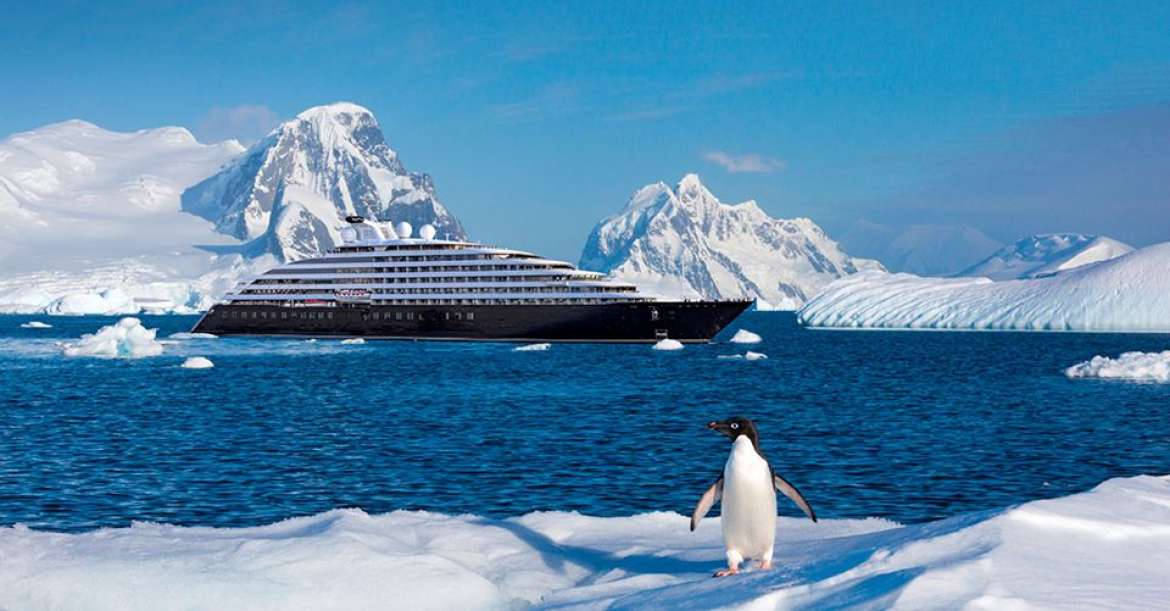
As Dnevnik/Ivan Forjan writes on the 15th of January, 2020, better business awaits the Rijeka shipyard 3 Maj and could arrive from as far away as Australia. After one of the most luxurious cruise ships in the world, Scenic Eclipse, was built in the Pula shipyard Uljanik last year, production should resume in Rijeka. The mega-investment is worth several hundred million euros in total.
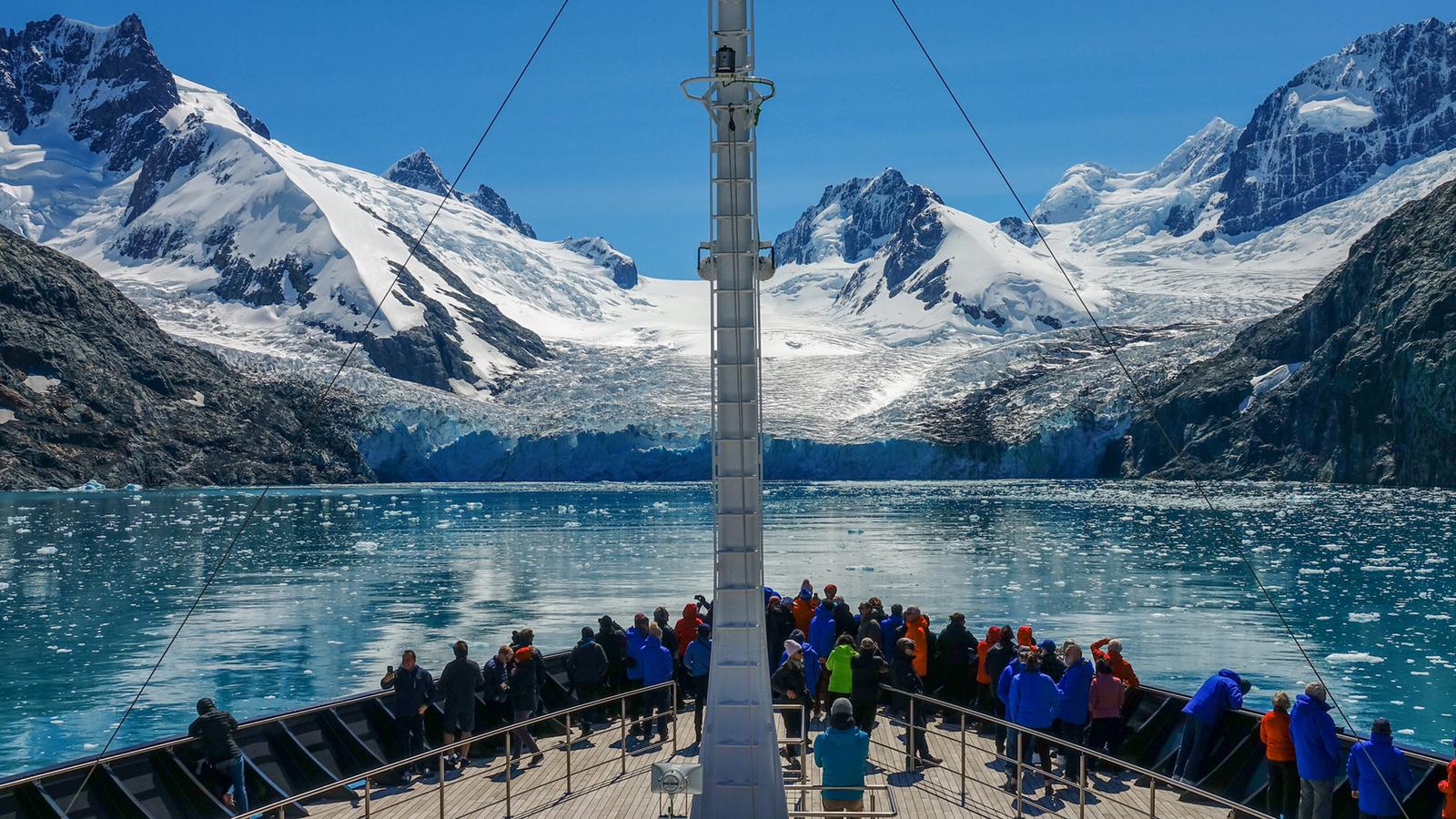
Due to its state-of-the-art equipment, it can sail all the seas of the world, even through the very iciest of waters. It also boasts its own submarine and even two helicopters. Its production cost more than 200 million euros in total, and the vessel you're looking at was constructed in Uljanik in Pula, Croatia. It has already sailed half of the world.
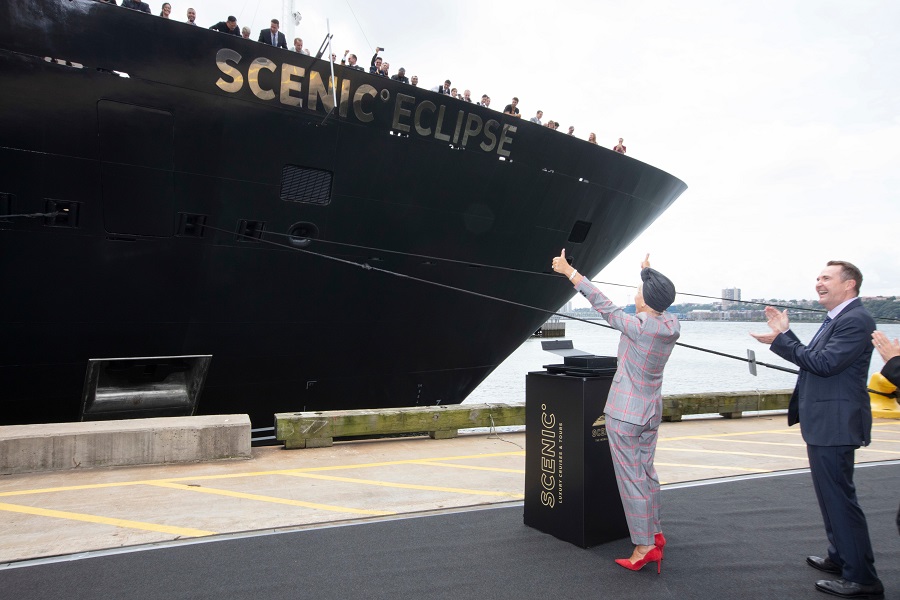
(Dame Helen Mirren christening Scenic Eclipse in New York)
"This is one of the most sophisticated and elegant ships of this type. We can all be proud that such a ship was made in Croatia. What makes this ship stand out is the luxury, a penthouse of about 200 square metres, offering dishes from different cuisines from across the world, from Asian to French,'' points out Sasha Cokljat of Scenic Group.
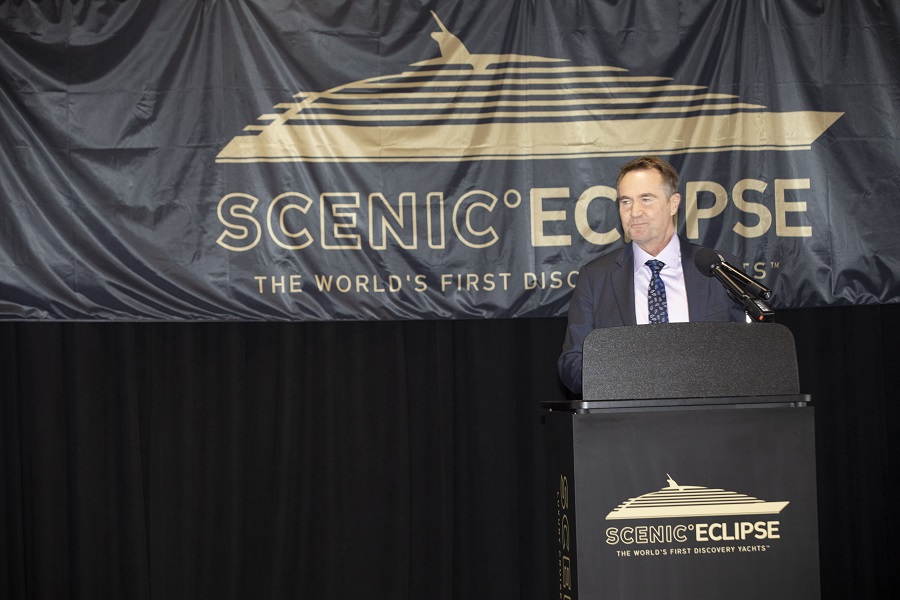
(Scenic Group owner Glen Moroney at the christening of Scenic Eclipse)
Satisfied with the work done by Uljanik for them, Australian investors now want to build five more ships like this to be constructed at Rijeka's 3 Maj shipyard. Glen Moroney, the owner of Scenic Group with extensive shipbuilding experience, is behind the whole project. Glen himself has come to see the expertise of local shipbuilders several times now.
"We were able to keep that nucleus of knowledge that was in Uljanik in 3 Maj. The whole team is Croatian, and that's exactly what we base our further development on and we think we can do it in Croatia. We're looking for some modality for joint construction and we're also in talks with the 3 Maj shipyard and with the Croatian Government,'' Cokljat stated.

The Ministry of Economy has confirmed that there is serious interest from Australians. And what can be said about everything that has happened at 3 Maj which has produced more losses than it has ships in recent years? Hundreds of workers have left, but the quality of vessels made there is still recognised by investors.
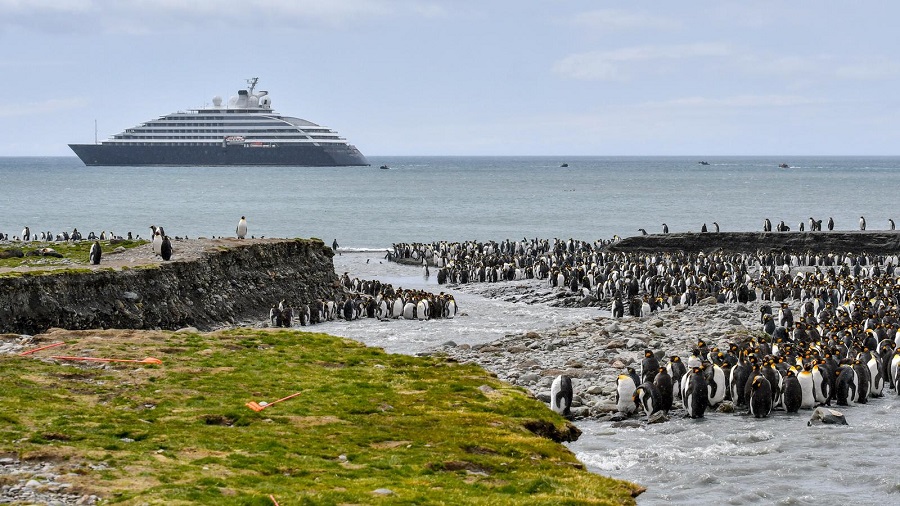
"It would mean one big plus, one boat is not enough work, one has to strive to get as much work as possible. Many things have changed, first of all - we get paid, our salaries have become regular," said Dalibor Cupkovic of 3 Maj's Trade Union Committee.
Five new exclusive cruisers would be a guarantee that this would continue. The job would go on until least until 2026, which would mean a minimum of 900 million euros of new investments in the Rijeka shipyard.
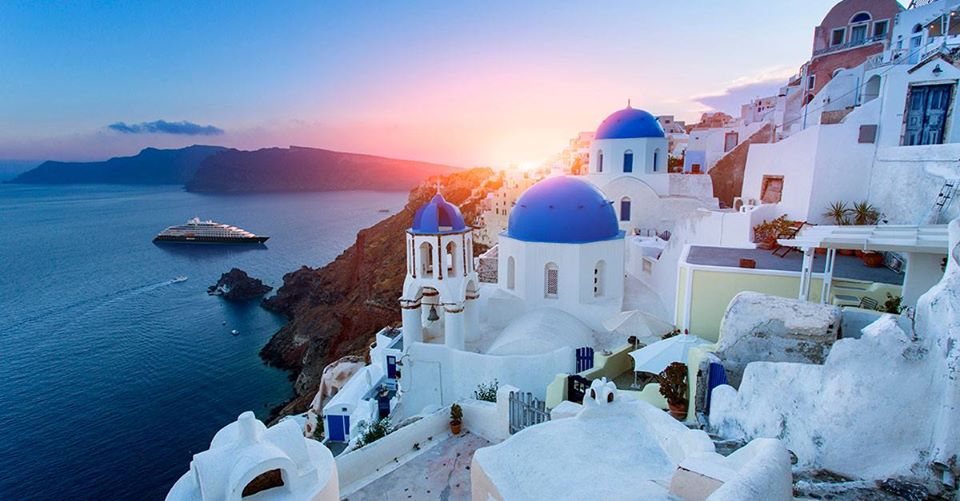
TCN reached out to Moroney for comment on the potential deal:
"We are very much aware that the Government of Croatia is actively pursuing a solution for shipbuilding in Croatia and our wish is to progress this exciting proposal with the government and the shipyard. We have already proven that together with Croatian engineers and shipbuilders we can build one of the most sophisticated cruise ships in the world, even under extraordinary circumstances. Scenic Eclipse did not cost Croatian taxpayers a penny and no state guarantees were taken. We finished the ship ourselves and now that we have the knowledge and practical experience, we are very confident that we can build and deliver five more ships in Croatia. The Government is being very cooperative and open with us so I look forward to the positive development and future of Croatian shipbuilding.”
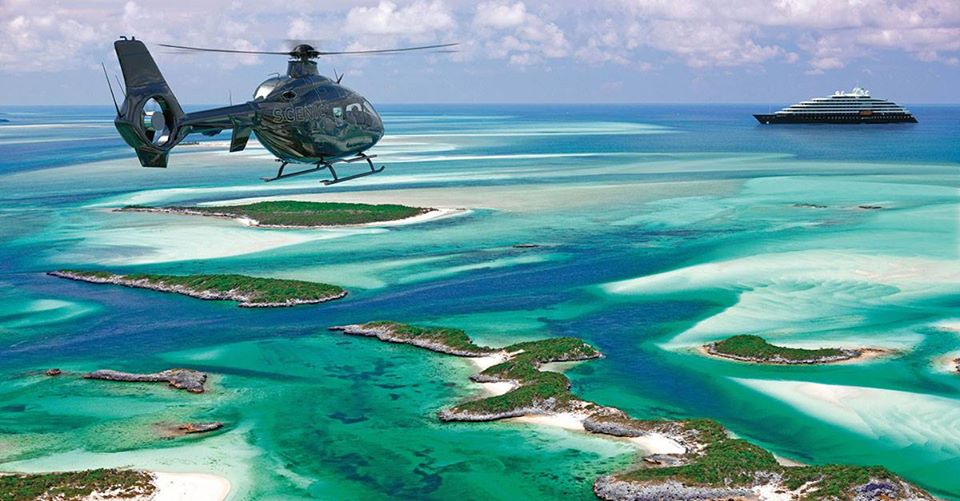
Great news potentially for Croatian shipbuilding, an industry where it has traditionally competed with the best in the world. From Tesla to Rimac Croatia has proved that it can deliver technologies that change and amaze the world. Scenic Eclipse and its fellow polar discovery yachts is the latest and could, just like Rimac, become Croatian top export technology product setting the standards globally.
Make sure to follow our dedicated Made in Croatia page for much more.
Founding of Niagara Tesla Innovation Centre Marked by Croatian Tie
Tuesday, January 15th, 2020, marks the celebration of two historical events. The occasion of the international opening of the first Croatian EU Presidency and the founding of the TESLA INNOVATION CENTRE (TIC) in the City of Niagara Falls, NY. In honor of these two outstanding historic achievements by a young Croatian Republic, The Academia Cravatica Institution and the Research and Development Center-Teslopolis, along with the founders of the TIC, and representatives of the City of Niagara Falls, tied a red Croatian tie, as a symbol of innovation, love, and unity, on the Nikola Tesla monument, made by Croatian sculptor Frano Kršinić in 1976. The Tesla Monument was erected on the site of the world's first hydroelectric plant that same year.
The main intention of the first Tesla Innovation Centre of its kind to be built on U.S. soil and the first in history to denote an official association between American and Croatian institutions is to return Niagara Falls to its heritage, legacy and the spirit of innovation of Nikola Tesla over the next ten years. The Tesla Innovation Centre will launch and implement a series of multidisciplinary projects and activities inspired by Nikola Tesla, and to build his center in the City of Niagara Falls City, the first of its kind in the world.
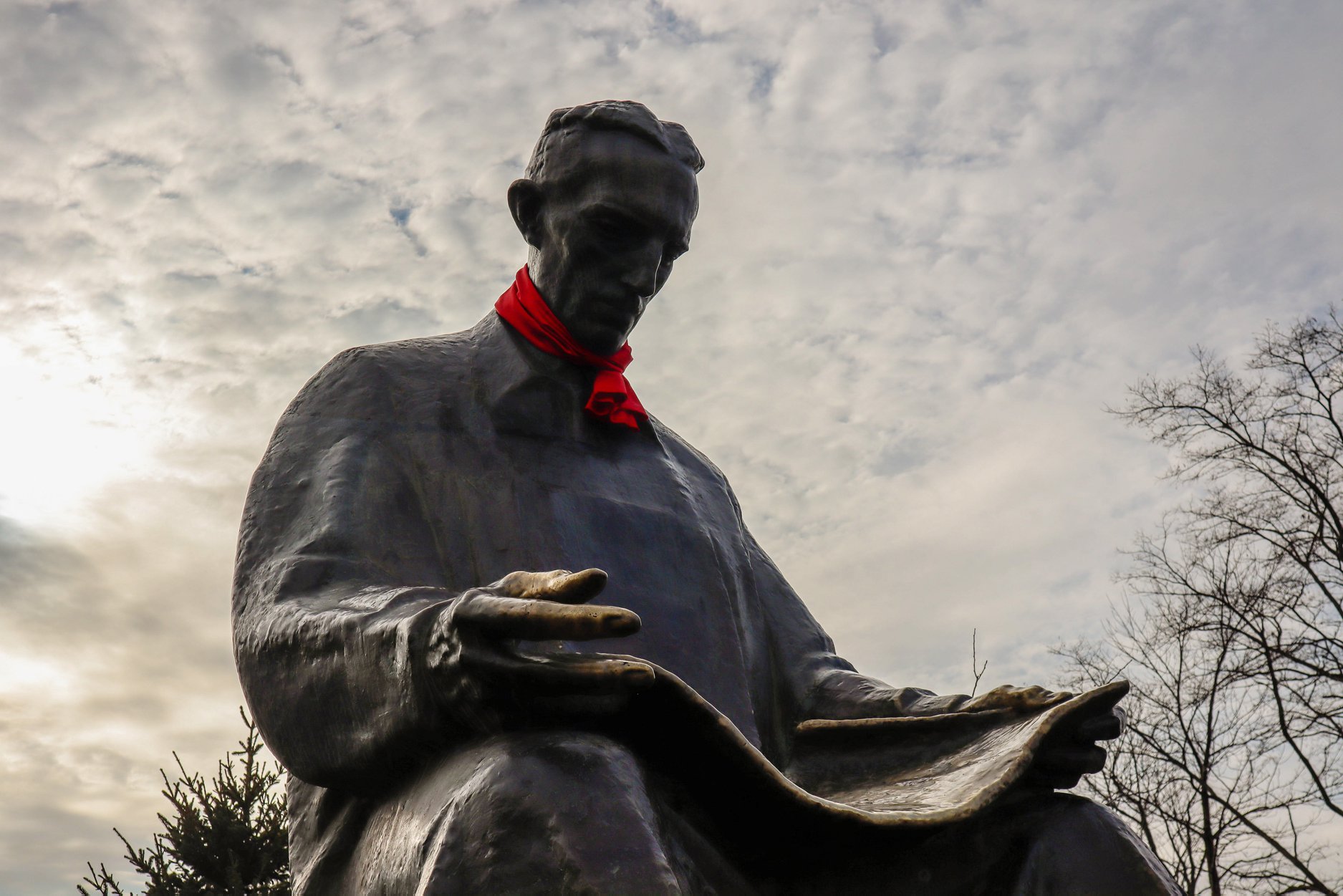
Tesla's AC (alternating current) system for the Niagara Falls hydroelectric plant, the first of its kind in the world, was set up in 1896, and it ushered in a new era in human civilization development. Tesla's dream of giving people the energy and power of the Niagara Falls, which he saw as a child on a lithograph in the laboratory of the school he attended in Karlovac and began researching more about the power of these waterfalls at the age of 17, stated, "I was fascinated by a description of Niagara Falls I had perused, and pictured in my imagination a big wheel run by the Falls. I told my uncle that I would go to America and carry out this scheme. Thirty years later, I saw my ideas carried out at Niagara and marveled at the unfathomable mystery of the mind. "
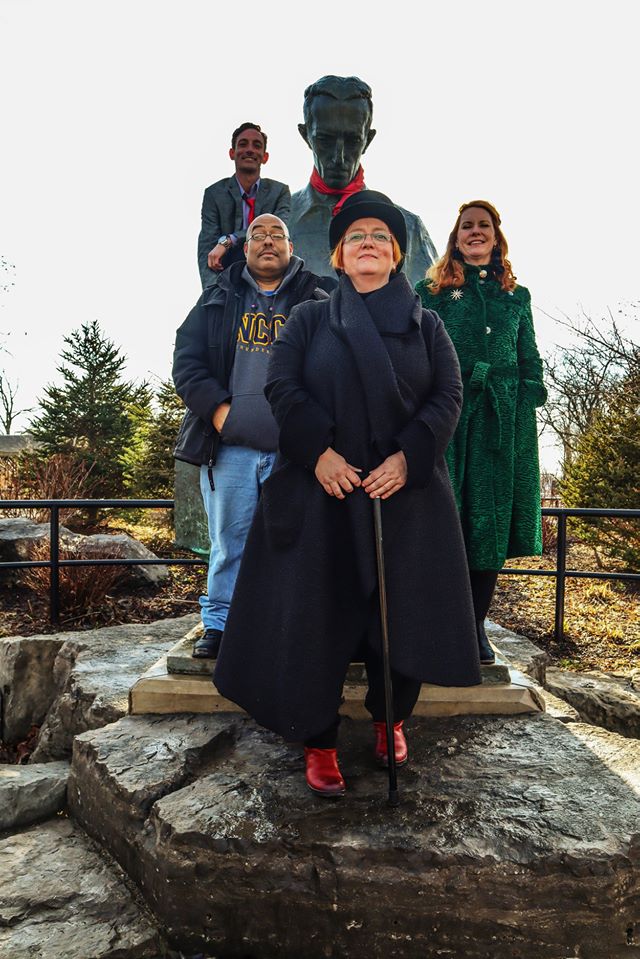
The tie is an original Croatian product and a symbol of love, unity, and innovation, which was created in the 17th century by Croatian women and recognized at the French Court as an extraordinary fashion accessory under the name of the cravat. From France, the cravat went on its journey and development, generating not only one of the most fashionable accessories but also a whole range of symbols of the human desire for the creation, beauty, and refinement of the human being in his pursuit of a free and dignified life. The act of tying the tie of love to the monument of Nikola Tesla is built on one of the most influential legacies of the City of Niagara Falls itself. Niagara Falls has a significant history and moments in the abolition of slavery and the human pursuit of a free and dignified life. Subsequently, Nikola Tesla dedicated his entire life and work, which he selflessly gave to humanity, the freedom and dignity of human life with what he achieved with the realization of the uses of the Hydroelectric Power Plant in Niagara Falls. TESLA INNOVATION CENTRE wants to continue that legacy, above all in the spirit of humanistic paradigms inspired by Tesla, its discoveries and technologies, which in our 21st century, people can experience technological realization!
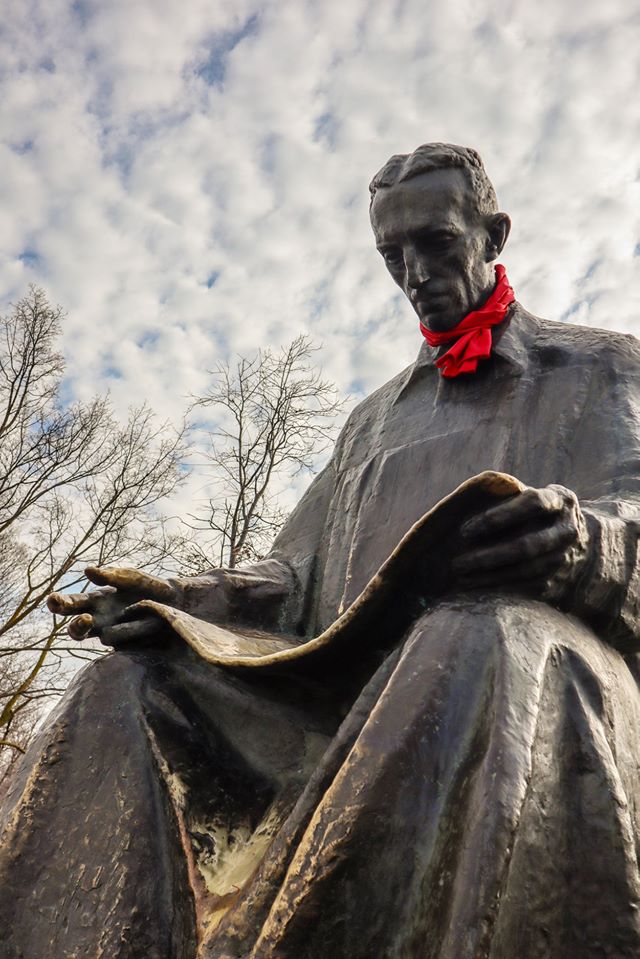
TIC FOUNDERS and BOARD MEMBERS:
Nicholas A Baio- Co-Managing Director of AIPH Worlds Fair and Expo 2025 & 2026.
Helena Bulaja Madunic – TESLOPOLIS CEO, founder, Tesla Expert, Creative Director, Visionary Leader, and Storytelling Innovator.
JACOB J. FLEMING SR. - Founder and Executive Editor of The Messenger Of Niagara Falls NY, NY. Niagara Falls, NY's first black-owned and operated newspaper and media outlet.
NIAGARA FALLS CITY REPRESENTATIVE and TIC partnering organization:
Sara Beilein Capen - executive director of the Niagara Falls National Heritage Area and Chairperson of the Alliance of National Heritage Areas, which is an alliance of the 49 Congressionally-designated National Heritage Areas throughout the United States.
BiH to Change Policy Towards Migrants Coming to Croatian Border?
ZAGREB, January 16, 2020 - Bosnia and Herzegovina's (BiH) new Security Minister Fahrudin Radončić will step up monitoring on the border with Serbia and Montenegro to stop the influx of illegal migrants from those countries and coordinate activities with ministers of the interior in the region, the Security Ministry said in a statement on Wednesday.
The statement was issued after a meeting of the operational group in charge of illegal migrations.
Announcing the new approach to dealing with illegal migrations in the country, Radončić said that his ministry could not be the only institution in the country in charge of care for migrants and that all institutions and government agencies should become involved.
Radončić told the heads of local police agencies who are members of the operational group that he would put emphasis on more efficient border control and prevention of illegal arrivals of migrants as well as on strengthening the capacity of the border police and office for aliens, adding that he would also hold talks with the neighbouring countries' ministers of the interior on ways to deal with the problem together.
Due to the winter conditions, the number of illegal migrants arriving in Bosnia and Herzegovina has decreased and currently around 5,500 illegal migrants are staying in reception centres in the country.
The measures announced by Radončić were advocated also by former Security Minister Dragan Mektić but he never received the support of the state leadership for them.
The Serb member of the Presidency of Bosnia and Herzegovina, Milorad Dodik, resolutely opposed proposals that soldiers be deployed along Bosnia and Herzegovina's eastern border to help police prevent illegal entries, and the state-level leadership has to date not approved the filling of more than 500 vacant police posts.
At the same time, the Bosnian Serb entity authorities are not allowing the opening of reception centres in their territory to relieve the pressure of migrants on the area of Bihać, and officials in almost all communities in the other entity, the Federation, have acted similarly.
More news about the migrant crisis can be found in the Politics section.

